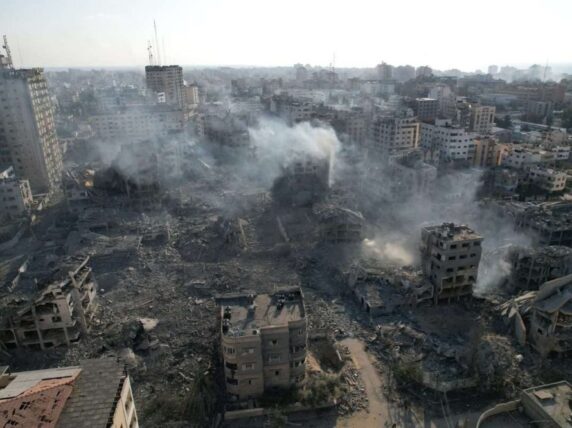Building better futures together: delivering sustainable buildings with NGOs across the globe
Article 25 is the UK’s leading humanitarian architectural NGO, which works in partnership with other NGOs globally to design and deliver high-quality hospitals, schools, and homes in the countries that need them most.
With over 100 projects completed across 35 countries to date, Article 25 effectively navigates the many challenges associated with building in earthquake zones, remote locations, regions with extreme weather cycles, and areas with unreliable power supplies.
Countless NGOs deliver essential healthcare and education in the world’s poorest countries. However, delivering these crucial services requires robust hospitals, clinics, and schools that are fit for purpose. For many NGOs, overseeing large-scale construction projects can be daunting due to the lack of in-house expertise and the high level of risk involved.
This is where Article 25’s unique capabilities come into play.
By partnering with Article 25, NGOs gain access to award-winning expertise in project management, risk reduction, sustainable construction, and affordability, ensuring successful and impactful project outcomes.
Empowering communities through comprehensive, collaborative partnerships
At the heart of Article 25’s mission is a commitment to listening. Each project begins with extensive community engagement, co-designing buildings with users to ensure they meet local needs.
Article 25 prioritises employing a local workforce over bringing in foreign teams. When local expertise matches their high-quality standards, they step aside, allowing locals to lead. They assemble diverse teams, making sure to include women and those in need of employment.
Believing in leaving skills behind, they train locals in construction techniques, boosting the economy and enabling communities to maintain their assets long-term.
Committed to sustainability, Article 25 uses local, natural materials that respect the landscape and culture, even in remote areas. Their buildings are designed to last, capable of withstanding extreme weather and incorporating seismic design in earthquake-prone regions.
Innovation and technology are integral. With experience in passive design and off-grid solutions, Article 25 makes buildings climate-positive and suitable for areas without mains power.
Dedicated to efficiency and affordability, Article 25 leverages pro-bono and low-bono expertise, passing savings to NGO partners, ensuring more resources reach those in need.
Here are a few examples of the exemplary partnerships Article 25 has cultivated.
Anandaban Hospital Trauma Centre, Nepal
In partnership with The Leprosy Mission in the UK and in Nepal, Article 25 built a new Trauma Centre for the Anandaban Hospital campus south of the Kathmandu Valley, following the 2015 earthquakes.
The hospital meets stringent seismic safety standards, providing a resilient building that can deliver a full range of medical services following a major earthquake. The 1850 sqm facility accommodates an Accident and Emergency Department, in-patient wards, operating theatres and a maternity unit. Built from locally sourced bricks and featuring insulated cavity walls, the hospital ensures year-round comfort for leprosy patients as well as patients from the local community.
Article 25 deliver to the standard needed for healthcare in the 21st century. We value the technical skill they bring to the process; this was essential in Nepal where we are building on the side of a mountain in an earthquake zone.
Sian Arulanantham Head of Programmes, The Leprosy Mission
Kao La Amani Children’s Village, Tanzania
Collaborating with Irish charity, Tír na nÓg Children’s Foundation, Article 25 designed the Kao La Amani Children’s Village, a safe and nurturing home for orphaned children in northern Tanzania where there are approximately 90,000 child orphans.
Designed with the community’s input, the village includes six cottages with live-in ‘Mamas’ providing intimate and supportive living spaces. Sustainable features like solar hot water heaters, rainwater harvesting, and off-grid solutions ensure low operational costs and environmental protection, transforming the lives of orphaned children by offering them stability and growth opportunities.
We would never ever have achieved any of this without Article 25. They have been instrumental in the success of this entire project. I’m not a contractor or a builder or an architect. I do not have the skills to bring a project like this to life. Building a project in a country like Tanzania, you don’t know the rules and regulations – it’s impossible. So much work went into the project behind the scenes before one thing was even put down on paper. When I found out that Article 25 was in existence, it was life changing.
Louise Quill, Founder, Kao La Amani Children’s Village
Clinic for Children with Cleft Palate and Cleft Lip, Morocco
Article 25 partnered with Operation Smile Morocco – part of a global charity of volunteer surgeons and clinical staff – to build a clinic in Oujda for children with cleft lip and palate, two very common birth defects that can be corrected by surgery.
Article 25 designed and attended the construction of this new facility in Eastern Morocco that provides pre- and post-surgical care, as well as free dental care to patients with facial deformities. STO, a German manufacturer, not only donated building materials but also sent technicians to provide local crew training on site to maximise construction funds and ensure high-quality finishes.
Article 25 and their teams can’t be rivalled by any other construction manager I have worked with. They are dedicated, professional, thorough, accommodating, responsive, hardworking, and committed to excellence. I always breathe a sigh of relief when I know I will be working with Article 25, because I know that they will act as an ambassador for my interests and never let me down.
Fouzia Mahmoudi, Co-founder & Vice-President, Operation Smile Morocco
Collège Amadou Hampaté Bâ, Niger
In collaboration with Collège Hampaté Bâ, Article 25 designed new classrooms and school facilities to accommodate up to 1,200 children from primary school age right through to sixth form.
Using passive design principles and locally sourced materials, Article 25 created comfortable learning spaces that overcome high temperatures and promotes sustainable building practices. The project also provided construction skills training for female students, promoting gender equality and employment opportunities.
It is a great opportunity for me. Now I can imagine myself as a future architect.
Chamsia Adamou Hawaza, female student
Together with Article 25’s engineering partners MHA Structural Design and Max Fordham LLP and contractors Afrique Univers, the project won the prestigious 2024 RIBA International Award for Excellence, two 2024 AIA UK Design Awards and a 2023 Institution of Structural Engineers award for sustainability and social impact – demonstrating the transformative power of partnership to create real change in communities around the world.
Building better futures together
Partnering with Article 25 drives impactful change. Their projects tackle multiple United Nations Sustainable Development Goals, fostering equality and building thriving, resilient communities. With their renowned expertise in architecture and project management, Article 25 empowers NGOs to achieve lasting, positive transformation.
If you have a project that needs a partner like Article 25, contact Chief Executive, Gemma Holding, to start a conversation that could change lives.
Category
News & ViewsThemes
Operations and contracts



